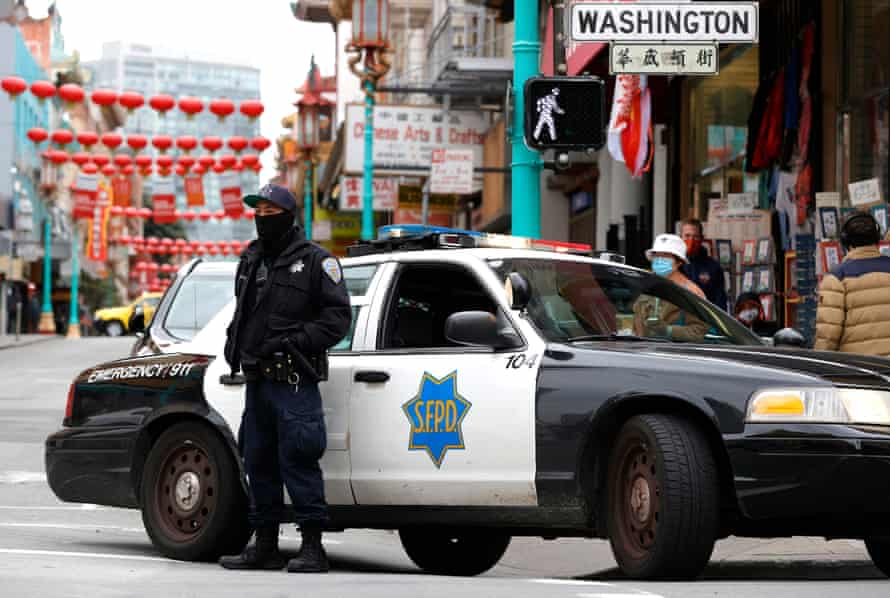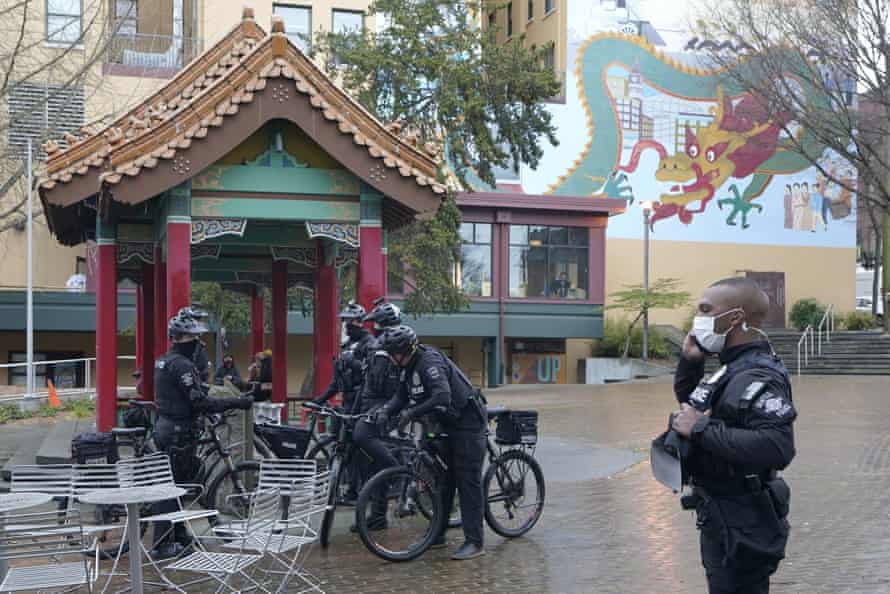The increased presence has provided relief for some, while others argue it’s a temporary and ineffective solution to a crisis

Vivian Ho in San Francisco, Fri 19 Mar 2021 06.00 EDT
Police in cities across the country increased foot patrols in Asian neighborhoods following the shootings at three Asian-owned spas in the Atlanta area.
From San Francisco to New York, Chicago to Philadelphia, police departments this week directed officers to step up their presence amid fears of anti-Asian violence after a shooter killed eight people, six of them Asian women, on Tuesday night.
“We are continuing to monitor the events around the tragic shooting of Asian Americans in Atlanta,” the Philadelphia police department tweeted. “While there is currently no known connection to our area, out of an abundance of caution, we have bolstered patrols around Asian communities and businesses.”
In the San Francisco Bay Area, the increased police presence provided welcome relief for some, members of the Asian community said on Thursday, some noting they had been reporting an increase intargeted crime for months.
Betty Louie, the adviser to the San Francisco Chinatown merchants association, said the country’s oldest Chinatown felt safer with more police. Louie said the department has a good relationship with many of the local business owners – she first learned of the Atlanta shooting when the neighborhood police captain texted her.
With the rise in reports of anti-Asian hate across the country, many older local Chinatown merchants and Asian elders have echoed these sentiments, saying they feel safer with more police. But after a summer of demonstrations over the police killing of George Floyd in Minneapolis, others argue that increased policing is a temporary and ineffective answer to a dire crisis.

“One of the natural reactions in moments of grief is fear,” said Sammie Ablaza Wills, director of APIENC, a not-for-profit group for the Asian and Pacific Islander transgender and queer community in northern California, to the Guardian. “But while we feel that fear, policing is not the thing that is going to alleviate it.
“For a lot of our communities, we know how much police have come in to just criminalize us more, make us feel unsafe, and not take our concerns seriously,” Ablaza Wills said. “We can see that with the sheriff in Atlanta who worked harder to humanize the assailant than to provide relief and care to the families that are experiencing this tragedy.”
In particular for those in the transgender and queer Asian American community that Ablaza Wills works with, many of whom have had to work in massage parlors similar to where the Atlanta shooting occurred, more police do not always make them safer or even feel safer,Ablaza Wills said.
“We need to invest in true community safety that centers on victims and survivors, that provides culturally competent healing and addresses root causes, like why people have to be working in high-contact jobs like massage parlors during a pandemic,” Ablaza Wills continued.
Those investments, however, take time. “I understand in the future, there may be other alternatives,” said Carl Chan, president of Oakland’s Chinatown chamber of commerce. “But I need people to tell me, how are we going to protect the community, our residents, our seniors today, tonight, tomorrow? If the future holds that we can do this without the police, then let’s do that in the future.”
Advocates against increased policing have suggested that instead of law enforcement officers, the community can patrol the neighborhood and escort seniors on their daily errands. More than 100 volunteers already walk Oakland’s Chinatown, Chan said. But he wondered: “When there’s a situation and there are people hurting us, are you asking the volunteers to use force and protect not just the people being attacked, but themselves?
“For those who do not live in fear in this community, it’s very easy for them to say they don’t want the police,” Chan continued. “But I have talked to almost every business in Chinatown, all the seniors. Every single one of them are saying we want the police.”

The issue is fraught because emotions – and fears – are so high at the moment. Chan’s voice grew thick when he began talking about why he felt he needed to advocate for police, even though he fully understands the arguments against the increased patrols. “Sometimes, I can’t even go to sleep without thinking of people getting attacked,” he said.
Liz Suk, interim director of electoral collaborative Oakland Rising, said she hopes to relate with those in the Asian American community who differ with her on the issue of policing. “You’re right,” Suk said she would say to them. “We need more safety. You have every right to feel safe. You have every right to know when you walk out the door that someone is not going to arbitrarily shove you or punch you in the face.”
The question, then to ask, she said is what would make them feel safe. “Oakland Chinatown is two blocks from police headquarters and we still have the level of violence that we have in this community,” Suk said. “So I then turn around and ask, ‘Well what is it that keeps you safe? Who are the people that really keep you safe?’
“We want to be able to walk out of our house and know that somebody is not going to hurt us or hit us or kill us,” she added. “When we ask people to imagine what the conditions of that look like, they’re much more aligned with what we’re talking about than with policing.”
